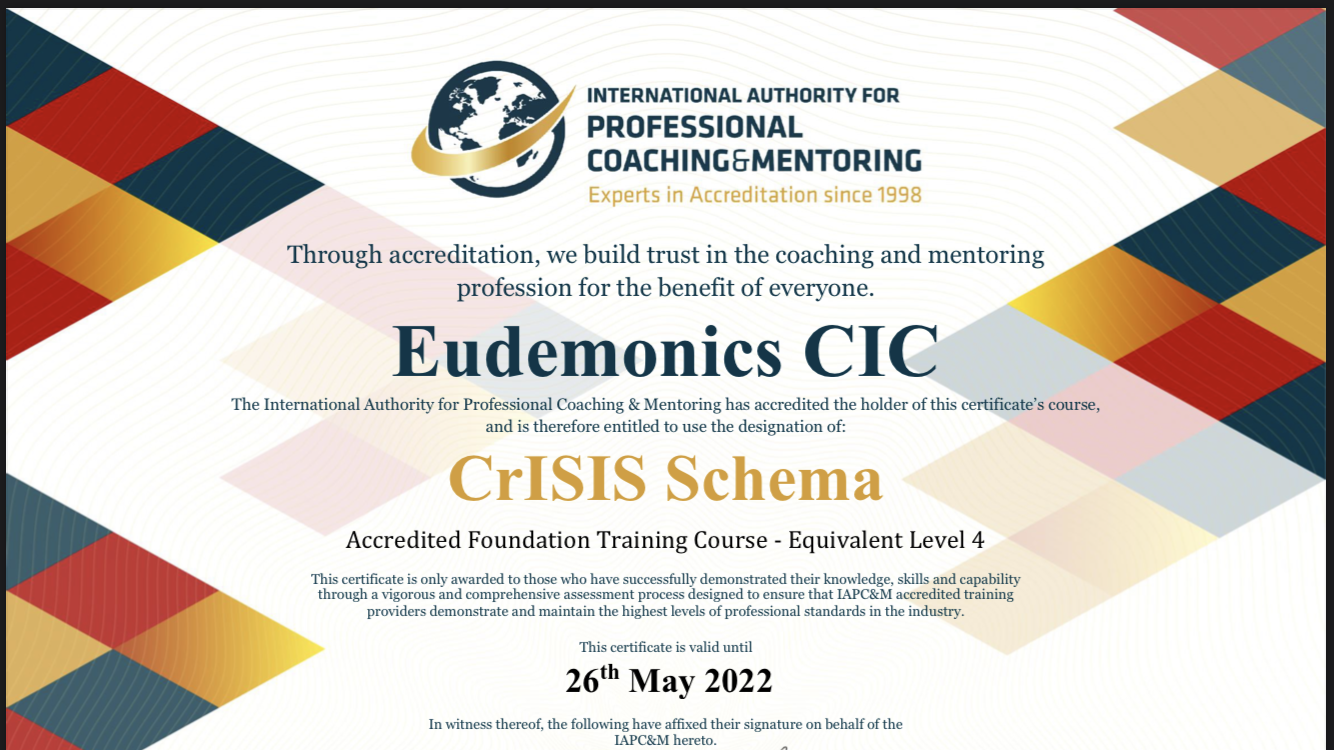Eudemonics are delighted to announce that our CRISIS workshop has been awarded external accreditation by the International Authority for Professional Coaching & Mentoring (IAPC&M).
Following an inspiring and stringent qualification process, the training has been accredited as a level 4 equivalent qualification.
Sean McCallum, Managing director of Eudemonics, said:
“This is a great step for the Coaching sector. Coaches are helping and caring professionals, and naturally seen as a go-to support resource when a client experiences something upsetting or distressing – sometimes, client’s will also want to tell their Coach about historic issues of emotional or psychological concern.
A fear for many Coaches is of not knowing how to handle such conversations effectively. CRISIS will help them to do just that – enhancing their Coaching skills, and supporting the psychological safety of their clients.”

The CRISIS workshop educates and empowers delegates with the knowledge and skills required to provide effective support for people following stressful, distressing or traumatic experiences.
What is the CRISIS Schema®?
The Critical Incident Stress Intervention & Support Schema® is a psychosocial system for helping people when they have experienced a distressing or overwhelming incident, event or situation.
The CRISIS Schema® provides an immediate and effective response to stress and trauma, supporting resilience and helping to prevent a decline into poor mental health.
In short, the CRISIS Schema® provides a supportive and humane response to the emotional and psychological needs of fellow people when something bad has happened to them.
Who delivers the CRISIS Schema®?
CRISIS Schema® Facilitator’s don’t have to be clinically trained therapists or counsellors.
Rather, they can be caring professionals, peers or volunteers who are able to demonstrate trustworthiness, discretion and non-judgmental values, and are suitably placed to support other people in times of emotional/psychological distress.
CRISIS Schema® Facilitator’s are equipped with a robust tool-set with which to provide effective and truly person-centred support.
When can the CRISIS Schema® be used?
The CRISIS Schema® can reused by trained Facilitator’s upon first contact with someone in distress.
Uniquely, the CRISIS Schema® can be delivered both during and following a critical incident, and also to provide follow up support.
What is a critical incident?
Essentially, any event, incident, situation or occurrence that has the potential to overwhelm someone’s natural coping abilities can be considered a ‘critical’ incident.
This definition allows us to consider life events that are not commonly associated with trauma, and support people throughout a range of situations such as (but not limited to);
- Financial loss
- Relationship closure
- Breach of trust
- Bullying & harassment
- childbirth
- Job loss
- Illness & medical procedure
- Military combat
- Accidents
- Terror attacks
- Natural disaster
- Sudden bereavement
- Violence
- Sex crimes.
This is not an exhaustive list – it must be considered that what is ‘critical’ is unique and subjective to the individual who experiences it, and regardless of the event type believed causal in someone’s distress, a trained CRISIS Schema® Facilitator can help.
Is the CRISIS Schema™ a form of therapy?
No, the CRISIS Schema® is a form of psychosocial support and therefore considered to be non-clinical in nature.
The CRISIS Schema® is simply an evidence-informed system enabling people to facilitate a powerful and supportive conversation, enhancing natural recovery processes, and helping to prevent a decline into poor mental health.
The CRISIS Schema® isn’t;
- Counselling
- Psychotherapy
- Treatment of any kind
- Labelling
- Diagnostic
- Psychological debriefing
A key difference between the CRISIS Schema® and therapy is that Facilitator’s do not attempt (in any way) to analyse or interpret what is happening for the person they are supporting – there is no diagnostic approach, and CRISIS Schema® Facilitator’s do not apply any form of treatment.
In what sectors is the CRISIS Schema® useful?
The CRISIS Schema® is useful wherever there are people, although the following sectors are areas where it’s particularly useful to have trained Facilitators;
- Coaching
- Voluntary agencies
- Education
- Business
- Social Services
- Emergency Services
- Social support groups
- Local authorities
- Criminal justice
- Travel industry
- Manufacture
- Construction
- Retail.
What are the strengths of the CRISIS Schema®?
The CRISIS Schema® has many strengths, here are a few to consider;
- Facilitates an immediate support mechanism for people in distress
- Applicable in diverse settings
- Culturally responsive peer support model
- Non-diagnostic, non-judgmental and naturally reduces stigma
- Theory-driven, providing a solid & credible system of support
- Functional and memorable model, easily applied.
- Highly effective in supporting people.




You must be logged in to post a comment.